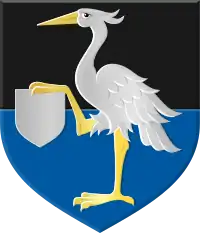Belgian heraldry
Belgian heraldry is the form of coats of arms and other heraldic bearings and insignia used in the Kingdom of Belgium and the Belgian colonial empire but also in the historical territories that make up modern-day Belgium. Today, coats of arms in Belgium are regulated and granted by different bodies depending on the nature, status, and location of the armiger.
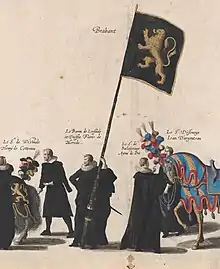

Characteristics
The characteristic of Belgian heraldry are similar to varying degrees to those of its neighbouring countries' (France, Netherlands, Germany).
Helms
In Belgium, barred helms are most commonly used, and are not reserved for the nobility like in some jurisdictions. They most often have gold bars, as well as a gold collar and trim. They are often lined and attached to the escutcheon with a shield strap.[1]
 Barred helm with gold bars, collar, and trim.
Barred helm with gold bars, collar, and trim. All silver barred helm.
All silver barred helm. Jousting or tourney helms are sometimes also used, but are rarer. They are the only alternative accepted by the Council of Heraldry and Vexillology to the barred helmet.[1]
Jousting or tourney helms are sometimes also used, but are rarer. They are the only alternative accepted by the Council of Heraldry and Vexillology to the barred helmet.[1]
History
.jpg.webp)
Terminology
Like English and some other countries' heraldry, achievements of arms are usually blazoned in a specialized jargon.
| Tinctures |  |
 |
 |
 |
 |
 |
 |
 |
 |
|---|---|---|---|---|---|---|---|---|---|
| English | Or | Argent | Azure | Gules | Vert | Purpure | Sable | Ermine | Vair |
| French | Or | Argent | Azur | Gueules | Sinople | Pourpre | Sable | Hermine | Vair |
| Dutch | Goud/Or |
Zilver/Argent |
Azuur/Lazuur (Blauw) |
Keel (Rood) |
Sinopel (Groen) |
Purper |
Sabel (Zwart) |
Hermelijn |
Vair |
| Ordinaries | 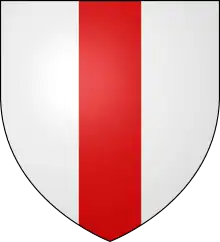 |
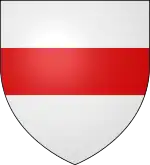 |
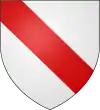 |
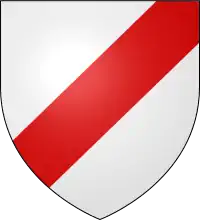 |
 |
.svg.png.webp) |
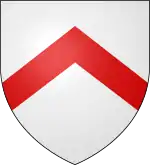 |
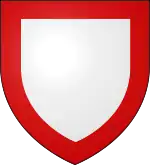 |
|---|---|---|---|---|---|---|---|---|
| English | Pale | Fess | Bend | Bend sinister | Cross | Saltire | Chevron | Bordure |
| French | Pal | Fasce | Bande | Barre | Croix | Sautoir | Chevron | Bordure |
| Dutch | Paal | Dwarsbalk | Schuinbalk | Linker schuinbalk or baar |
Kruis | Schuinkruis or andrieskruis |
Keper | Schildzoom |
| Division of the field |
 |
 |
 |
 |
 |
 |
|---|---|---|---|---|---|---|
| English | Party per fess | Party per pale | Party per bend | Party per bend sinister |
Quarterly | Party per saltire |
| French | Coupé | Parti | Tranché | Taillé | Écartelé | En sautoir |
| Dutch | Doorsneden | Gedeeld | Geschuind | Linksgeschuind | Gevierendeeld (in vier kwartieren) |
Schuin gevierendeeld |
Civic heraldry
National arms
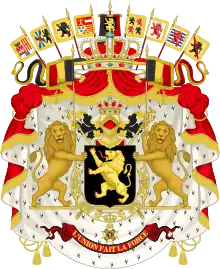 |
|
Other versions
 Middle version
Middle version Lesser or State coat of arms
Lesser or State coat of arms.svg.png.webp) Escutcheon and crown
Escutcheon and crown
Communities, regions, and language areas
 Coat of arms of the Brussels-Capital Region.
Coat of arms of the Brussels-Capital Region.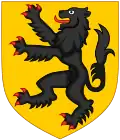 Coat of arms of Flanders.
Coat of arms of Flanders.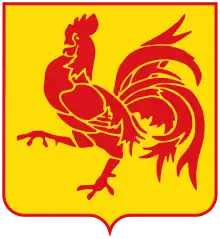 Coat of arms of Wallonia.
Coat of arms of Wallonia.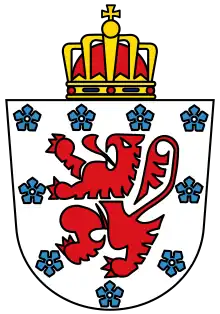 Coat of arms of the German-speaking Community.
Coat of arms of the German-speaking Community.
Provinces
Municipal heraldry
Municipal heraldry is regulated through the competent council of the community in question, which are the Council of Heraldry and Vexillology for the French Community and the Flemish Heraldic Council for the Flemish Community.[3][4]
Colonial heraldry
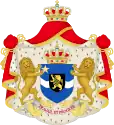 Coat of arms of the Congo Free State.
Coat of arms of the Congo Free State. Coat of arms of the Belgian Congo.
Coat of arms of the Belgian Congo. Coat of arms of Ruanda-Urundi.
Coat of arms of Ruanda-Urundi.
Royal heraldry
The coats of arms of the Belgian royal family is currently regulated by a Royal Decree published on 19 July 2019 and signed on the same day, by King Philippe. This decree also reinstated the Saxonian escutcheon in all the royal versions of the family's coat of arms.[5][6] The reinstatement of the shield of Saxe-Coburg-Gotha into the royal arms occurred shortly after the visit of King Philippe and Queen Mathilde to the ancestral Friedenstein Castle.[7] The king also added translations of the motto into the three official languages of Belgium, to reflect his wish "to be the King of the whole Kingdom and of all Belgians".[8] The latest royal decree therefore reverses previous changes made to the Royal versions of the coat arms which removed the armorial bearings of Saxony during the First World War.
- Coats of arms of the King
 Coat of arms of King Leopold I, 1831–1865
Coat of arms of King Leopold I, 1831–1865.svg.png.webp) Coat of arms of Leopold II and Albert I, 1865–1921
Coat of arms of Leopold II and Albert I, 1865–1921.svg.png.webp)
 Coat of arms of the reigning monarch since 2019, used by Philippe
Coat of arms of the reigning monarch since 2019, used by Philippe
- Coats of arms of the Royal family
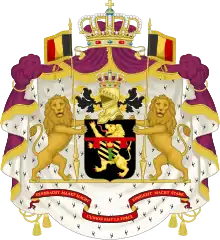 Coat of arms of a former king, used by Albert II
Coat of arms of a former king, used by Albert II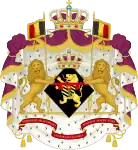 Coat of arms of a former queen regnant
Coat of arms of a former queen regnant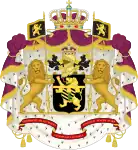 Coat of arms of the Duke of Brabant
Coat of arms of the Duke of Brabant Coat of arms of the Duchess of Brabant, used by Princess Elisabeth
Coat of arms of the Duchess of Brabant, used by Princess Elisabeth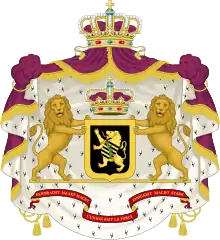 Coat of arms of a prince of Belgium
Coat of arms of a prince of Belgium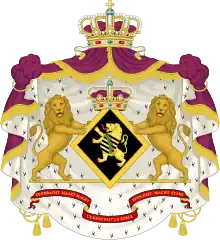 Coat of arms of a princess of Belgium
Coat of arms of a princess of Belgium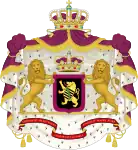 Coat of arms of a prince of the royal house
Coat of arms of a prince of the royal house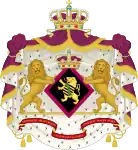 Coat of arms of a princess of the royal house
Coat of arms of a princess of the royal house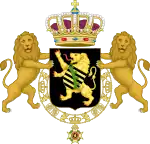 Coat of arms of the Royal House of Belgium
Coat of arms of the Royal House of Belgium Lesser arms of the Royal House of Belgium
Lesser arms of the Royal House of Belgium
Individuals and families
Like civic arms, arms of non-noble individuals and families (in the form of family associations) are regulated by the competent council of the community in question.[3] These are the Council of Heraldry and Vexillology for the French Community[9] and the Flemish Heraldic Council for the Flemish Community.[3] Today, both councils grant a helm with torse and mantling as well as a motto as additaments of the shield. The additaments reserved for the nobility, such as crowned helmets (i.e. crest coronets) and rank crowns (coronets), supporters, banners and battle cries, mantles and pavilions, are prohibited.[3]
Before that, the Genealogical and Heraldic Office of Belgium recorded the arms of persons and families.[3]
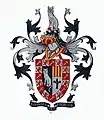 Example of bourgeois (or burgher) arms: the coat of arms of the de Muyser Lantwyck family.
Example of bourgeois (or burgher) arms: the coat of arms of the de Muyser Lantwyck family.![Coat of arms of the de Brabant family [fr]](../I/De_Brabant_(Perwez_and_Wavre)_achievement.svg.png.webp) Coat of arms of the de Brabant family [fr]
Coat of arms of the de Brabant family [fr]![Coat of arms of the Vander Borcht family [fr]](../I/Vander_Borcht_achievement.svg.png.webp) Coat of arms of the Vander Borcht family [fr]
Coat of arms of the Vander Borcht family [fr]![Arms of the Dewandre family [fr]](../I/Dewandre_achievement.svg.png.webp) Arms of the Dewandre family [fr]
Arms of the Dewandre family [fr]
Nobility
Arms of the Belgian nobility are regulated by the Council of Nobility.[3]
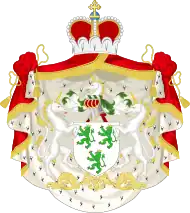 Coat of arms of the de Lannoy family with a princely mantle.
Coat of arms of the de Lannoy family with a princely mantle.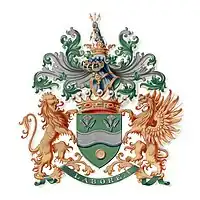 Coat of arms of the Empain Barons.
Coat of arms of the Empain Barons..svg.png.webp) Coat of arms of the Counts d'Udekem d'Acoz
Coat of arms of the Counts d'Udekem d'Acoz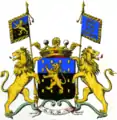 Example of banners on the arms of the de Norman et d'Audenhove family.
Example of banners on the arms of the de Norman et d'Audenhove family.
Coronets rankings
.svg.png.webp) King |
.svg.png.webp) Crown prince |
 Prince |
 Duke |
 Marquess |
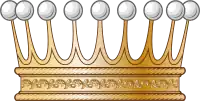 Count |
 Viscount |
Baron |
 Knight |
 Squire |
Notes and references
- Conseil d’héraldique et de vexillologie (2016). Vadémécum à l'usage des requérants [Handbook for Applicants] (PDF) (in French). Ministère de la Communauté française.
- Wapenrol van de ridders van het Gulden Vlies (fragment) [Coat of Arms of the Knights of the Golden Fleece (Fragment)] (in Dutch), retrieved 27 August 2020 – via lib.ugent.be
- "Héraldique en Belgique" [Heraldry in Belgium]. Association Royale Office Généalogique et Héraldique de Belgique (in French). Retrieved 17 June 2020.
- Meuwissen, Eric (20 July 1995). "Les Miroirs de l'identite communale mode d'emploi ils sont sept a veiller sur nos armoiries" [The Mirrors of Municipal Identity, Instructions for Use, There Are Seven to Watch over Our Coat of Arms]. Le Soir (in French). Retrieved 17 June 2020.
- "Arrêté royal du 12 juillet 2019" [Royal Decree of July 12, 2019] (in French). 19 July 2019. Retrieved 23 July 2019 – via Moniteur Belge.
- Boffey, Daniel (2 August 2019). "Saxe Appeal: King of Belgium Reintroduces German Lineage". The Guardian.
- Ilse, Jess (13 July 2019). "King Philippe and Queen Mathilde Visit Ancestral Castles During Visit to German States". Royal Central. Retrieved 23 July 2019.
- "Belgian Royal Coat of Arms Gets a 'Modern' Update". Brussel Times. 1 August 2019. Retrieved 2 August 2019.
- "Des armoiries pour 150 euros" [Coat of Arms for 150 Euros]. La Libre (in French). 16 October 2003. Retrieved 17 June 2020.
Bibliography
Heraldic laws and customs in Belgium
- L. Arendt; A. De Ridder (1896). La législation héraldique de la Belgique (in French). Brussels.
{{cite book}}: CS1 maint: location missing publisher (link) - chevalier Braas, La législation nobiliaire en Belgique, Brussels, 1960.
- Claude Chaussier, Le droit ancien et actuel des armoiries non nobles en Belgique, Brussels: Éditions du S.C.G.D., 1980.
- Jean-Baptiste Christyn, Jurisprudentia Heroica, Brussels, 1668 and 1689.
- Georges Dansaert, ″L'Art Héraldique et ses diverses applications″, in: Nouvel armorial belge, Brussels, 1949, pp. 113–119.
- Georges Dansaert, ″Du droit de propriété des armoiries et de ses conséquences″, in: Nouvel armorial belge, Brussels, 1949, pp. 7–110.
- Lucien Fourez, Le droit héraldique dans les Pays-Bas catholiques, Brussels, 1932.
- Octave le Maire, "Diplômes d'armoiries bourgeoises conférées par le roi Guillaume", in: L'Intermédiaire des généalogistes, Brussels, n° 91, 1961, pp. 34–36.
- Pierre Nisot, Le droit des armoiries. Essai de systématisation et de construction théorique, préface de M. C. Terlinden, professeur à l'Université de Louvain, membre du Conseil héraldique de Belgique, membre de la Commission royale d'histoire, Brussels : P. Dyckmans, 1924.
- Jean Scohier, L'Estat et comportement des armes, Brussels, 1597.
- PANTENS, Chr., Le cri en héraldique, in: Le Parchemin, 58, 1993, n° 285, p. 171-184.
- VAN ORMELINGEN, J.-J., De toekenning van het adellijk wapen, in: Le Droit nobiliaire et le Conseil héraldique (1844–1994), Brussels, 1994, p. 139-169.
- DE MOFFARTS D'HOUCHENÉE, baron St., L'écartelé, mode de rappel, dans les armoiries concédées, d'armoiries d'une autre famille, in: Le Droit nobiliaire et le Conseil héraldique (1844–1994), Brussels, 1994, p. 221-234.
- HOUTART, J.-F. (ed.), Florilegium Heraldicae Belgicae (Fédération généalogique et héraldique de Belgique, Cahier 4), Brussels, 2004.
- VAN ORMELINGEN, J.-J., Enregistrement officiel d'armoiries en Belgique, in: A. VANDEWALLE, L. VIAENE-AWOUTERS & L. DUERLOO (eds.), Genealogica & Heraldica. Handelingen van het XXVI Internationaal Congres voor Genealogische en Heraldische Wetenschappen, Brussel/Bruxelles, 2006, p. 427-436 (cf. VAN ORMELINGEN, J.-J., L'enregistrement officiel des armoiries en Belgique, in: Bulletin de l'Association de la noblesse du Royaume de Belgique, n° 246, avril 2006, p. 3-14).
- Jules Bosmans, Traité d'héraldique belge, 1890.
Individuals and families
- P. Bohet et H. Willems, Armorial belge, Brussels, 1965.
- Damien Breuls de Tiecken, Armorial bruxellois, Brussels, 2009.
- Georges Dansaert, Armorial belge du bibliophile (same with viscount de Jonghe d'Ardoye and J. Havenith), Brussels, 1930.
- Georges Dansaert, Nouvel armorial belge, ancien et moderne, précédé de l'art héraldique et ses diverses applications, Brussels : Éditions J. Moorthamers, 1949.
- Georges de Crayencour, Dictionnaire Héraldique, tous les termes et figures du blason, Brussels : G. de Crayencour, 1974 (first edition).
- Armorial héraldique vivante, in: Le Parchemin, Genealogical and Heraldic Office of Belgium, 2003.
- Jan van Helmont, Dictionnaire de Renesse. Lexique héraldique illustré, Louvain, 1994.
- Jean-Paul Springael, Armoiries de personnes physiques et d'association familiale en communauté française, edited by the direction of the Patrimoine culturel
- Carnet Mondain
- État présent de la noblesse belge [fr; nl]
Municipalities
- Lieve Viaene-Awouters and Ernest Warlop, Armoiries communales en Belgique, Communes wallonnes, bruxelloises et germanophones, 2002, 2 volumes.
.svg.png.webp)


.svg.png.webp)
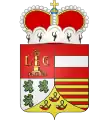
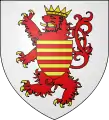
.svg.png.webp)
.svg.png.webp)


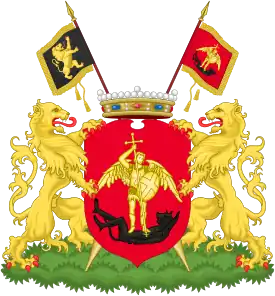
.svg.png.webp)

.svg.png.webp)



